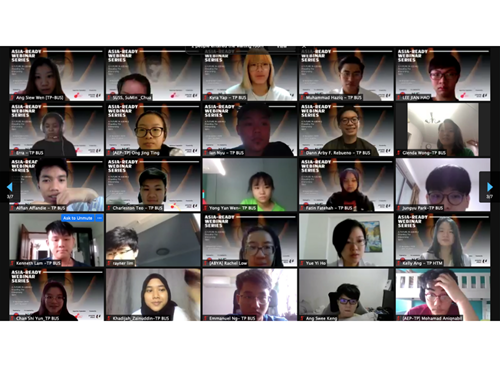Entrepreneurial landscape in ASEAN has potential to grow
30 November 2020
Start-up owners in the region spoke to Singaporean youths about their journey and shared tips on how one can become an entrepreneur.
Written By: Phoon Jia Hui
Aspiring entrepreneurs need to find meaning in whatever they do.
That was a piece of advice given by Vincent Ha, CEO of local-based fintech start-up Lyte Ventures. It was among the topics discussed during a webinar, A Future in ASEAN | Propelling the Enterprising Spirit, attended by Singaporean youths on Nov 15.
It was the third part of the Asia-Ready Webinar series organised by the National Youth Council (NYC) and ASEAN Business Youth Association (ABYA).
Moderated by founder of social enterprise Left Right SG Mala Rajpal, the panelists included Vincent, CEO of telehealth app OOCA Kanpassorn Suriyasangpetch from Thailand and CEO of SmallWorld Venture Rithy Thul from Cambodia.
Here are the key takeaways from the session:
1. ASEAN is an unique market for entrepreneurship
With the different cultures present in Southeast Asia, Kanpassorn acknowledged this is what makes the region unique. She added that there are other factors, when all combined, makes it tougher for entrepreneurs.
Using Thailand as an example, she said: “It is much more difficult to be an entrepreneur here because it is harder to find funds and investors with a professional background. These are all important factors in starting up and running a business.”
Meanwhile, Rithy said the small market in Cambodia makes it easier for entrepreneurs.
“I really love this part about Cambodia. Like rowing a boat, it is easy for you to spin on the spot but you will never be able to do the same with a big ship,” he said.
“Entrepreneurship is difficult yet robust and it is easy to make a move a change. If need be, you can pivot your business as well.”
The situation in the region is however slowly improving, observed Kanpassorn.
“In the past, the region was seen as a market that’s not as attractive but recently, it’s been seen as an emerging market. Singapore is in a much better position compared to other countries in Southeast Asia,” said Kanpassorn.
“However, this still has to be proven at a much longer run.”

Singaporean youths attending the webinar. PHOTO CREDIT: NATIONAL YOUTH COUNCIL
2. Never be afraid to get out of one’s comfort zone
Noting that capital isn’t exactly a concern in Singapore, Vincent urged youths to venture abroad if they were keen to make it big in entrepreneurship as opportunities could be limited here.
“You don’t know what the world is out there until you get out of it, so I would encourage you to get out there and explore to broaden your horizons,” he said.
With the entrepreneurial landscape booming in the region, Vincent added there is no reason holding potential entrepreneurs back.
“Of course, there may be dangers,” he said.
“There have been more discussions in the region and organisations are starting conversations in the region as well. For example, you have cross-border trade and financing with countries like Thailand and Indonesia. It is definitely easier in this day and age.”

3. More youths are interested in social entrepreneurship
Mala believes social entrepreneurship is becoming more popular in the region and that can be attributed to increased youth collaborations.
“In the last decade, I’ve seen entrepreneurship evolve as an area of work. When I first started out in 2010, I could count with my fingers those going down the entrepreneurship route,” she said.
“More youths these days are thinking about going into entrepreneurship and I see a pattern where youths want to solve real problems such as social issues on the ground. As they resonate with it, they see the needs for it more naturally.”
What are traits that a successful entrepreneur should possess then?
For Kanpassorn, it is the never-say-die spirit.
“First and most importantly, it is the growth mindset and always wanting to be the better version of yourself,” she said.
“When you are trying to do something that has no instructions or written solution, you still have to do it anyway. It is alright to fail but you have to keep moving and trying.”
A clear vision is vital and something all entrepreneurs should have, said Rithy.
“You have to define your own success,” he added.
“Regardless of what we do, there’s always something for us to climb. By defining your own success, you can build more of such in future.”
